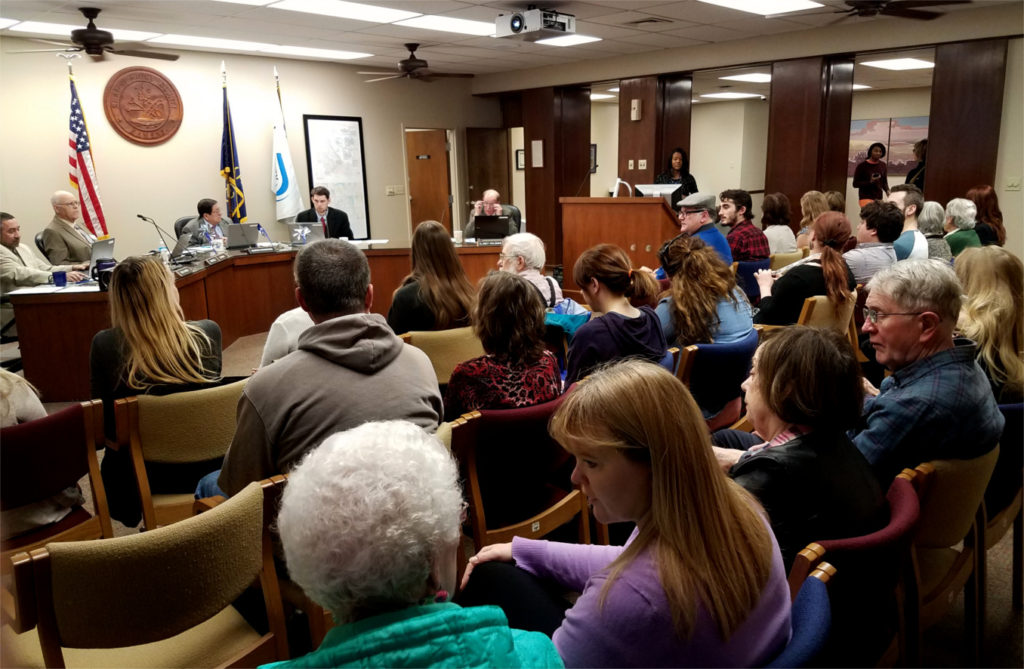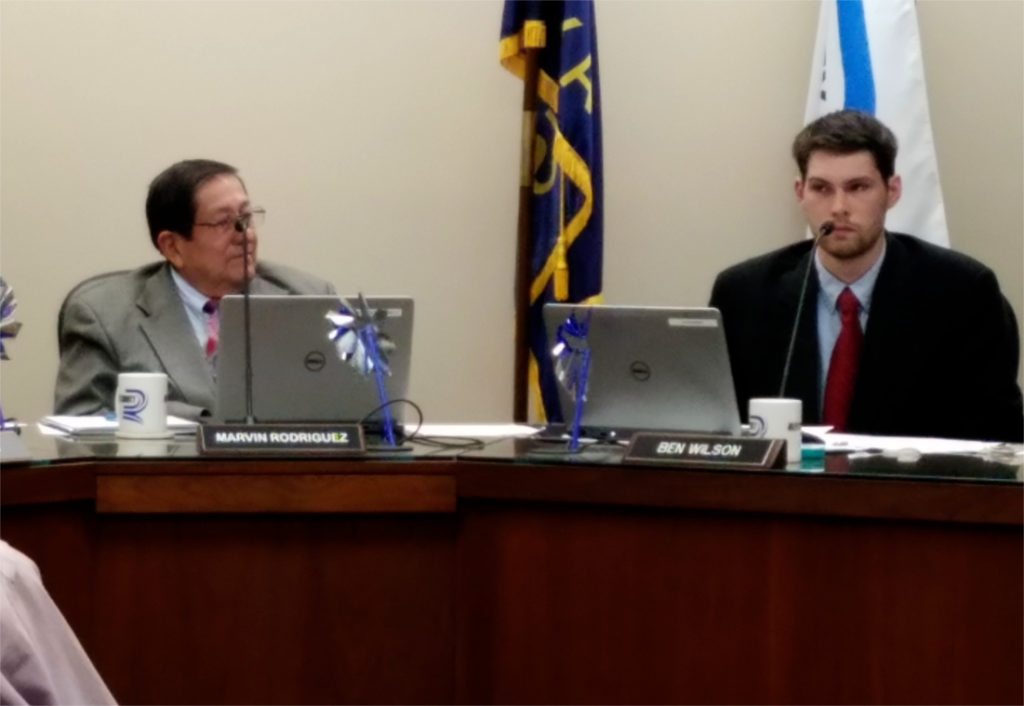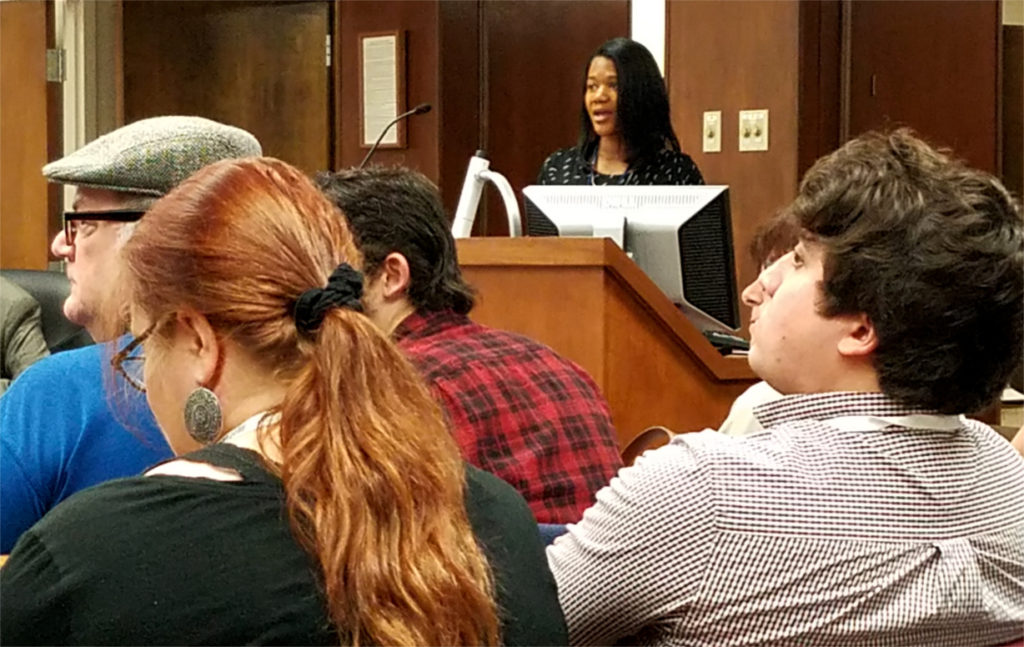

Constituents pack the Riley County Commission Chambers Thursday morning. Two commissioners expressed opposition to signing off on a grant application for family planning funding, but reluctantly agreed to move forward with the application after a lengthy debate. (Staff photos by Brady Bauman)
What is normally a routine piece of county business turned into an impromptu informational meeting on reproductive and sexual health inside the Riley County Commission Chambers Thursday morning.
Commissioners debated if the county should sign on for a Kansas Department of Health and Environment grant application for the county health department. The grant, which totals $722,897 if approved by the state, includes funding for various services provided by the health department, including maternal and child healthcare and child care licensing.
The chambers were packed with constituents, who said they were tipped via social media there was a possibility the commission may not sign off on the application. Ultimately, the all-Republican commission did with a much delayed 3-0 vote and to the loud applause of citizens and health department staff.

Riley County commissioners Marvin Rodriguez, left, and Ben Wilson, sit while constituents and county health department staff speak Thursday morning in the Riley County Commission Chambers.
But it was the $332,837 for family planning that bothered commissioners Ben Wilson and Marvin Rodriguez.
Rodriguez is just a couple months into his first term after defeating the more centrist incumbent, Robert Boyd, in the May 2016 primary. Wilson, elected in 2014, is also in his first term, which runs until January 2019.
Rodriguez told Gail Chalman, who retired last year as the county health department’s nursing supervisor, that he didn’t think the county should be giving out condoms and encouraging sexual behavior.
“What about the condoms?” Chalman clarified.
“I don’t really think that the county should be giving them away when they’re so cheap at the store,” he answered.
“Oh, okay,” Chalman responded. “So giving them away… would you be more comfortable if the county charged for those? I know some counties do.”
“If they charge more than the stores,” Rodriguez said. “All it does is perpetuate the problem that you have.”
Rodriguez then attempted to cite statistics regarding sexually transmitted diseases and seemed to suggest offering such services encourage sexual activity that lead to STDs.
“To me, you’re going backwards,” he said. “You’re giving away something to somebody that allows them to keep up this habit.”
“Of having sexual relations?” Chalman interjected.
“That’s correct,” Rodriguez said.
While Rodriguez was fixated on condoms, Wilson — who’s father is the organizing pastor of Christ the Redeemer Church in Manhattan and one of 12 children, including four more who are deceased — said religious reasons made him apprehensive about the grant application.
“I think two issues that haven’t been addressed are one, the issue of some taxpayers having a religious objection to contraceptives, and I feel it’s inappropriate for the government to forcibly tax them for something that goes against their religion,” said Wilson, who is by far the youngest commissioner of the three at age 23. “I know that it isn’t just Catholics anymore — and certainly not all Catholics anymore, probably not even a majority — but between Mormons and Protestants as well, there are families that have religious objection to it.
“The second issue is the fact that some of the contraceptive methods do induce abortions.”

Riley County Health Department Director Jennifer Green speaks inside the Riley County Commission Chambers Thursday morning.
Wilson was cut off by the room after that statement, but continued with cherry-picked information he said he received from the health department.
“To use drugs that can induce an abortion between fertilization and implantation, I believe would be abortion,” he said. “The American College of Gynecologists and Obstetricians weasels with the definitions to say that they’re not technically abortifacients but they do destroy a living human life, so I move we direct the health department to rework the grant application without requesting contraceptives for the purpose of contraception.
“That would leave open the ability to use them for medical purposes, which I agree is a legitimate use. Leave family planning open for education, for cancer screenings — there’s a lot of good things they do — just specifically zeroing out the contraception for the sake of contraception for those two reasons.”
KMAN researched The American College of Gynecologists and Obstetricians and no such organization could be found. The American Congress of Obstetricians and Gynecologists, however, does exist and may be what Wilson was referring to.
Rodriguez then wanted to add his own modification to the grant application to dismiss funding for condoms, but Jennifer Green, the director of the county health department, felt the need to clarify Wilson’s comments.
“The research is clear (long-acting, reversible contraception) do not cause abortions,” Green said. “And county taxpayer dollars are not funding that.”
Long-acting reversible contraceptives — or LARC’s, as Green called them — are methods of birth control that provide effective contraception for an extended period without requiring user action. They include injections, intrauterine devices (IUDs) and subdermal contraceptive implants.
Green also rebuffed Wilson’s argument based on religion.
“Research shows that the majority — no matter if you’re Catholic, if you’re Protestant, if you are mainline Protestant, evangelical Protestant or you identify yourself as religious but do not have a specific denomination — that overall, 99 percent of women support contraception.”
Green also told commissioners that such services save the county money in the long run.
“For every public dollar that you invest, you save $7 in healthcare costs,” she said.
Commission chairman Ron Wells agreed with Green and said accepting such funds is for the betterment of the community.

Wells
“Bottom line is, our job is to be protective of the citizen’s money,” he said. “We’re not supposed to be the moral police, and people are going to take the actions they take. Our job is to protect the taxpayers from spending additional monies caused by the actions of some irresponsible — and responsible — people, and that’s my comment.
“We’re not here to be the moral police,” Wells reiterated, much to the applause of the room.
Wells allowed numerous citizens to publicly comment on the matter, including Levi Smith, who was Wells’ Democratic opponent in the November election.
One Manhattan resident, a young woman, told commissioners the packed room demonstrated the issue’s importance.
“This is why we’re showing up today,” she said. “The Riley County Health Department saved my life about seven years ago. I was uninsured. I was receiving birth control not only for my health, but for my family planning. They helped me with screening with family planning, and I agree, Mr. Wells, that we are not the moral police. We are here to protect our community and to provide our community with access to affordable health care and affordable birth control — not just for family planning but to make their lives better.
“For us to apply to these grants is so vital, and I don’t think we should be judging what people do behind closed doors or what they do with access to condoms or birth control. I work in the public school system, and many of our students and parents rely on the Riley County Health Department to keep them safe, happy and healthy. We shouldn’t use our moral or religious judgement to make a decision on this.”
That again ushered enthusiastic applause in the room and was matched later when the motion made by Wells to approve the grant application in its entirety was passed after Rodriguez and Wilson voiced “reluctant” yes votes.
Still, both Wilson and Rodriguez pledged to take another look at ways to cut contraceptive funding after the grant is confirmed.
The post Commissioners Wilson, Rodriguez express opposition to contraceptive grant application appeared first on News Radio KMAN.

